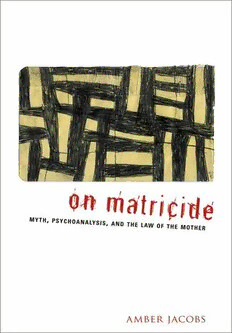
On Matricide: Myth, Psychoanalysis, and the Law of the Mother PDF
02007·0.659 MB·English
Most books are stored in the elastic cloud where traffic is expensive. For this reason, we have a limit on daily download.
Preview On Matricide: Myth, Psychoanalysis, and the Law of the Mother
Description:
Despite advances in feminism, the "law of the father" remains the dominant model of Western psychological and cultural analysis, and the law of the mother continues to exist as an underdeveloped and marginal concept. In her radical rereading of the Greek myth, Oresteia, Amber Jacobs hopes to rectify the occlusion of the mother and reinforce her role as an active agent in the laws that determine and reinforce our cultural organization. According to Greek myth, Metis, Athena's mother, was Zeus's first wife. Zeus swallowed Metis to prevent her from bearing children who would overthrow him. Nevertheless, Metis bore Zeus a child-Athena-who sprang forth fully formed from his head. In Aeschylus's Oresteia, Athena's motherless status functions as a crucial justification for absolving Orestes of the crime of matricide. In his defense of Orestes, Zeus argues that the father is more important than the mother, using Athena's "motherless" birth as an example. Conducting a close reading of critical works on Aeschylus's text, Jacobs reveals that psychoanalytic theorists have unwittingly reproduced the denial of Metis in their own critiques. This repression, which can be found in the work of Sigmund Freud and Melanie Klein as well as in the work of more contemporary theorists such as André Green and Luce Irigaray, has resulted in both an incomplete analysis of Oresteia and an inability to account for the fantasies and unconscious processes that fall outside the oedipal/patricidal paradigm. By bringing the story of Athena's mother, Metis, to the forefront, Jacobs challenges the primacy of the Oedipus myth in Western culture and psychoanalysis and introduces a bold new theory of matricide and maternal law. She finds that the Metis myth exists in cryptic forms within Aeschylus's text, uncovering what she terms the "latent content of the Oresteian myth," and argues that the occlusion of the law of the mother is proof of the patriarchal structures underlying our contemporary social and psychic realities. Jacobs's work not only provides new insight into the Oresteian trilogy but also advances a postpatriarchal model of the symbolic order that has strong ramifications for psychoanalysis, feminism, and theories of representation, as well as for clinical practice and epistemology.
See more
The list of books you might like
Most books are stored in the elastic cloud where traffic is expensive. For this reason, we have a limit on daily download.
